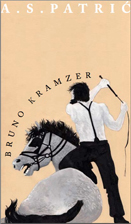How/why did you get into writing?
If literature is a mirror on life, writers are the kinds of people that don’t really see themselves in sheets of glass or mirrors. I grew up in the western suburbs of Melbourne but I saw my reflection more clearly in Russian novels from the nineteenth century or American Science Fiction from the 1960s and 70s. At some point a reader understands that life is a narrative and that it’s possible to find a bit of authority over you own story if you start writing.
Do you plan out your story, or work it out along the way?
There are writers that say they need to map it all out before they set out on the journey. Otherwise they might lose their way – realising after they’ve gotten from point A to point B that point C is nowhere. They lose weeks or even years in a literary wilderness that might have been avoided with better preparation. For me, the wilderness is the whole point (A, B and C). That sense of peril in the writing can’t be faked, and peril is what sets the blood coursing through sentences. The reason we go out into the wilderness is so that we can return with something on the page that hasn’t already been domesticated.
Any writing habits which help you write?
Writing is itself a habit. Like every habit, it gets stronger the more it’s done. I write every day. Sometimes I write from sunup to sundown but it’s never less than an hour every day.
What do you love about writing?
According to Chuang Tzu a rabbit trap exists because of the rabbit and once you’ve caught the rabbit you can forget the trap. He goes on to say that a word is a trap and meaning is the rabbit. Once you’ve got the meaning you don’t need the word anymore. What I love about writing is building these diabolical machines that are essentially traps for much larger beasts. Some have been known to trap full grown men and women.
Anything you hate about writing?
It’s a sad fact that only a few writers in Australia (it is less than a one in a million deal, statistically speaking, maybe even one in two million) who make as much from novels annually as a garbage collector does for picking up bins. Almost all writers make far, far less than Tim Winton and your local garbo.
Any tips for other writers?
Reading is essential. Reading for pleasure. Reading for edification. Reading broadly. Reading deeply. Reading as religion. In terms of writing tips though, all any writer ever need read is the Paris Review Interviews. There are four volumes in book form and even more Q&As online. It’s such a vast literary resource you’ll never need to go anywhere else for writing tips.
You’ve got a couple of short story collections out at the moment — how do you feel about the short story form?
I feel like I’m living in the short story Renaissance. This is slightly offset by the death throes of Literature. Well, at least, that’s something I keep hearing from all quarters. I don’t think it’s true but there’s no doubt that it’s a time of turbulent change and I’d say that the short form is best suited and most able to adapt to the new opportunities and possibilities.
What’re you working on at the moment?
I was delighted to be able to put the final touches recently to Life on Crumbs, a novel I’ve been working on for the last five years. And excitingly, I’m going through the proofs of a novella which will be released in October 2013. The book’s publisher is Finlay Lloyd and it’s called Bruno Kramzer (top).
